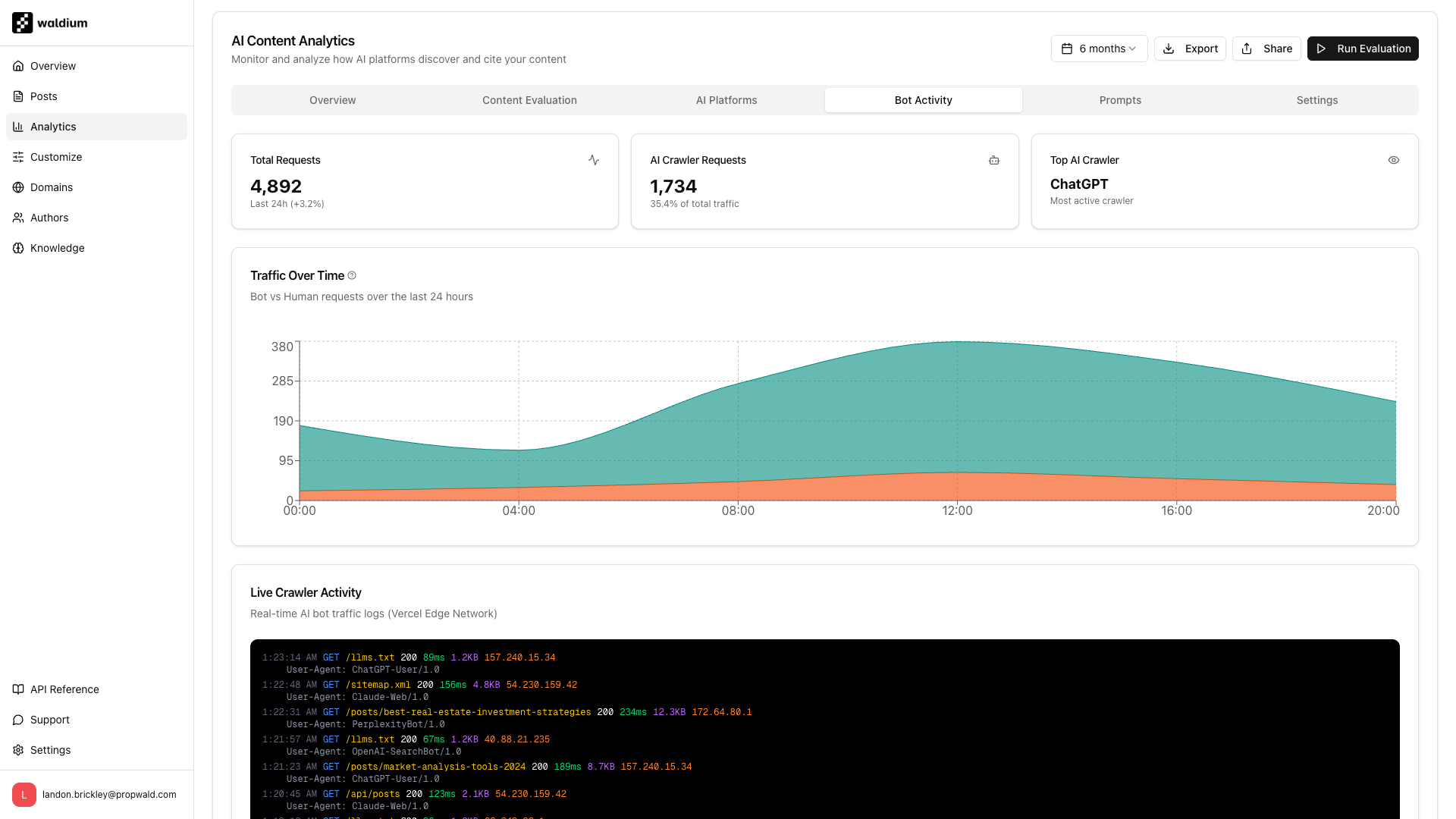AI Crawlers
When someone asks ChatGPT "How do I screen tenants for my rental property?" and it recommends your guide, that's AI crawlers at work. Here's how to make that happen.
AI systems crawl your content differently than Google. They're looking for comprehensive, accurate information they can confidently recommend to users.
How AI Systems Find Your Content
The Discovery Process
AI systems like ChatGPT, Claude, and Google's AI Overviews crawl the web to build their knowledge base. But they're not just collecting links - they're evaluating whether your content is trustworthy enough to recommend.
What happens when AI crawls your site:
- Content analysis - AI reads your posts and evaluates quality
- Authority assessment - Checks if you're a credible source on the topic
- Accuracy verification - Looks for evidence backing your claims
- Recommendation decision - Decides whether to cite your content
What Makes AI Trust Your Content
AI systems prioritize content that's comprehensive, accurate, and from credible sources. Here's what they look for:
Content quality signals:
- Complete coverage - Your post thoroughly addresses the topic
- Clear structure - Well-organized with proper headings
- Specific examples - Concrete details, not vague advice
- Recent information - Up-to-date content that reflects current best practices
- Source credibility - Content from recognized experts or companies

How Waldium Helps You Get Discovered
Automatic Content Optimization
Waldium structures your content in ways that AI systems can easily understand and trust.
Built-in AI optimizations:
- Comprehensive posts - AI-generated content covers topics thoroughly
- Clear hierarchies - Proper H1, H2, H3 structure for easy parsing
- Knowledge-backed content - Posts reference your uploaded documents
- Consistent formatting - Standardized structure across all content
Knowledge Base Authority
Your uploaded documents become proof that you're a credible source. When AI systems see your content, they can verify it against your knowledge base.
Authority building:
- Product docs - Show you're the actual creator/owner
- Case studies - Demonstrate real-world experience
- Technical guides - Prove deep expertise in your field
- Research papers - Establish thought leadership
Practical Steps to Get AI Citations
1. Upload Your Best Documents First
Before creating any content, upload your most valuable documents to establish credibility.
Priority documents:
- Product documentation - Your actual product specs and features
- Case studies - Real customer success stories with data
- Technical guides - Step-by-step instructions you've written
- Research/analysis - Industry insights and findings
2. Create Comprehensive Content
Instead of short blog posts, create thorough guides that AI systems can confidently recommend.
Content that gets cited:
- Complete guides - "How to manage rental properties from acquisition to sale"
- Problem-solving guides - "How to handle tenant disputes when rent is late"
- Comparison posts - "Property management software: Complete analysis with examples"
- Best practices - "10 proven strategies for achieving X"
3. Use Specific, Actionable Information
AI systems prefer content with concrete details over vague advice.
Good: "Use a credit score of 650+ and require 3x monthly rent as income for tenant screening" Bad: "Check if tenants can afford the rent"
4. Keep Content Current
AI systems favor recent, up-to-date information. Regularly update your posts with new information.
Freshness strategies:
- Update existing posts - Add new information to old content
- Create follow-up posts - "What's new in X since 2024"
- Address current events - Comment on recent industry developments
Measuring Your AI Visibility
Track When AI Systems Cite You
The ultimate success metric is when AI systems recommend your content in their responses.
How to monitor:
- Search for your brand - Ask ChatGPT/Claude about topics you cover
- Monitor social media - Look for people sharing AI responses that cite you
- Check Google AI Overviews - See if your content appears in AI-generated search results
- Track referral traffic - Monitor visitors coming from AI system recommendations
Analytics to Watch
Use traditional metrics alongside AI-specific tracking to understand your content's impact.
Key metrics:
- Time on page - Longer engagement suggests valuable content
- Bounce rate - Low bounce rate indicates content meets expectations
- Social shares - People sharing your content increases AI discovery chances
- Backlinks - Other sites linking to you signals authority
Common Mistakes to Avoid
Don't Focus Only on Keywords
AI systems care more about content quality than keyword density.
Instead of: Stuffing posts with target keywords Do: Create comprehensive content that naturally covers the topic
Don't Create Thin Content
Short, surface-level posts rarely get AI citations.
Instead of: "5 quick tips for X" Do: "Complete guide to X: Everything you need to know"
Don't Ignore Your Knowledge Base
Your uploaded documents are your competitive advantage.
Instead of: Writing generic content Do: Reference your specific products, case studies, and expertise